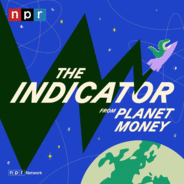For four decades, the US has maintained a consistent policy position: money should be fairly free to come and go in and out of the country. That's changing. Two sections in the One Big Beautiful Bill Act would add friction. First is a 3.5% tax on immigrants sending money home, commonly known as remittances. Second is what's known as Section 899 or, colloquially, the 'revenge tax'. This one is making Wall Street wary. It would slap extra taxes on people and businesses investing in the U.S. if their home countries were deemed to tax Americans unfairly. We explain these two taxes that could mark a shift in our free-flowing money era. Related episodes: The long view of economics and immigration (Two Indicators) (Apple / Spotify) The "chilling effect" of deportations (Apple / Spotify) For sponsor-free episodes of The Indicator from Planet Money, subscribe to Planet Money+ via Apple Podcasts or at plus.npr.org. Fact-checking by Sierra Juarez. Music by Drop Electric. Find us: TikTok, Instagram, Facebook, Newsletter. Learn more about sponsor message choices: podcastchoices.com/adchoicesNPR Privacy Policy

Wirtschaft
The Indicator from Planet Money Folgen
A bite-sized show about big ideas. From the people who make Planet Money, The Indicator helps you make sense of what's happening in today's economy. It's a quick hit of insight into money, work, and business. Monday through Friday, in 10 minutes or less.
Folgen von The Indicator from Planet Money
300 Folgen
-
Folge vom 10.06.2025What's a revenge tax?
-
Folge vom 09.06.2025How doctors helped tank universal health careA debate has been raging over universal health care in the U.S. since the 1940s. Back then, a formidable opponent emerged to dump a lot of money into ensuring it wouldn't happen. That opponent was doctors. Today on the show, Sally Helm, a Planet Money reporter, comes to us in her capacity as the host of HISTORY This Week to detail how doctors helped tank single pay healthcare back then and the role communism played in the fight. A longer version of this episode is available at HISTORY This Week from the History Channel. Related episodes:Why do hospitals keep running out of generic drugs? (Apple / Spotify)Socialism 101For sponsor-free episodes of The Indicator from Planet Money, subscribe to Planet Money+ via Apple Podcasts or at plus.npr.org.Fact-checking by Sierra Juarez. Music by Drop Electric. Find us: TikTok, Instagram, Facebook, Newsletter. Learn more about sponsor message choices: podcastchoices.com/adchoicesNPR Privacy Policy
-
Folge vom 06.06.2025Why U.S. workers keep getting more productiveFor the last couple of years, U.S. labor productivity has been on the rise. And economists don't know exactly why. So today on the show, the president of the Federal Reserve Bank of Chicago plays economic detective and helps us investigate some different theories about why U.S. workers seem to be more productive than in prior decades. Related episodes:What keeps a Fed president up at night (Apple / Spotify)Productivity and workforce whiplash (Apple / Spotify)For sponsor-free episodes of The Indicator from Planet Money, subscribe to Planet Money+ via Apple Podcasts or at plus.npr.org.Fact-checking by Sierra Juarez. Music by Drop Electric. Find us: TikTok, Instagram, Facebook, Newsletter. Learn more about sponsor message choices: podcastchoices.com/adchoicesNPR Privacy Policy
-
Folge vom 05.06.2025Gilded Age 2.0?To hear President Trump tell it, the late 1800s, i.e. the Gilded Age, were a period of unparalleled wealth and prosperity in the U.S. But this era was also marked by corruption and wealth inequality. Sound familiar? On today's show, is history repeating itself? Related episodes: Trump's tariff role model (Apple / Spotify) Worst. Tariffs. Ever. (Apple / Spotify) For sponsor-free episodes of The Indicator from Planet Money, subscribe to Planet Money+ via Apple Podcasts or at plus.npr.org. Fact-checking by Sierra Juarez. Music by Drop Electric. Find us: TikTok, Instagram, Facebook, Newsletter. Learn more about sponsor message choices: podcastchoices.com/adchoicesNPR Privacy Policy
